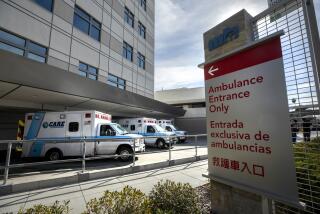U.S. to Audit Tenet Hospital Bills
Tenet Healthcare Corp. disclosed Wednesday that U.S. regulators are preparing to audit its hospitals to determine whether the Santa Barbara-based company properly billed Medicare for certain services.
Officials at the Department of Health and Human Services said the audit, which was first made known to Tenet on Oct. 28, was prompted by concerns raised by a contractor that processes Medicare claims for the government.
Department officials declined to provide details, but said the audit would examine “outlier payments” made to Tenet’s hospitals nationally. These payments are special Medicare funds that are paid to hospitals for unusually costly procedures, and Tenet has been receiving an extraordinarily high share of these reimbursements.
Analysts said both the audit and the fact that Tenet waited more than a week to disclose it presented problems.
A Tenet spokesman defended the timing of the company’s release, saying it was waiting to get more specifics, but analysts expressed exasperation at a company that has been rocked in the last two weeks by a series of events that have hurt its credibility and erased nearly half its stock price.
Tenet was roundly criticized by investors after it waited a day to disclose a federal raid last week at its hospital in Redding.
“Here we go again,” said Sheryl Skolnick, an analyst at Fulcrum Global Partners in New York.
Tenet, the nation’s second-largest publicly traded hospital company, with 113 facilities, has been reeling amid Wall Street questions about outlier Medicare payments and the investigation of alleged medical fraud involving two doctors at the Redding facility.
On Wednesday, the California attorney general’s office, acting on the request of the state medical board, said it would seek a court order to prevent the two doctors, Chae Hyun Moon and Fidel Realyvasquez Jr., from practicing medicine pending the outcome of the probe.
An attorney general spokesman said that papers seeking a temporary restraining order probably would be filed Friday in Shasta County and that a hearing would be held Tuesday.
Moon, head of cardiology at Redding Medical Center, and Realyvasquez, who is chairman of Redding Medical’s cardiac surgery, have continued to see patients since Oct. 31, when the FBI made public that it was investigating whether the two doctors performed numerous unnecessary heart procedures since 1995.
Ron Joseph, executive director of the California Medical Board, said Wednesday that based on the FBI’s affidavit and his agency’s investigation, “we do believe there has been a violation of medical practices.”
Realyvasquez’s attorney, Malcolm Segal of Sacramento, said, “I don’t think there is any basis for” a restraining order. He added, “When all this is done, I’m confident that Dr. Realyvasquez will be exonerated.”
Moon could not be reached for comment, and his lawyer, John W. Reese Jr. of Redding, did not return calls Wednesday.
The two doctors have not been charged with anything. Tenet executives have said it is up to the medical staff at Redding to decide doctors’ practicing privileges, although the company this week took the step of having outside medical experts review the two doctors’ pending cases before any procedures are performed.
Tenet has not been named as a target in the medical fraud investigation, but the problems facing Moon and Realyvasquez could eventually have a significant effect on the company’s finances.
Although Redding is a relatively small hospital, with 238 beds, it is one of the company’s most profitable -- largely because of the high-volume cardiology program the two doctors established.
Among other sources of revenue, Redding Medical Center receives an unusually large share of outlier payments because the hospital performs many specialized and costly heart procedures. Outlier payments at Tenet have been a focus on Wall Street since Oct. 28, when an analyst downgraded its stock and suggested that the company relies too much on these special payments.
Tenet, in a statement Wednesday, tried to put the best foot forward on the federal audit.
“We are pleased to cooperate with this audit, as we are confident that it will demonstrate that our hospitals did, in fact, obey the rules,” said Jeffrey Barbakow, chairman and chief executive.
Shares were off 6 cents at $26.28 on the New York Stock Exchange.
Judy Holtz, a spokeswoman for the Inspector General’s Office at the Department of Health and Human Services in Washington, said Wednesday that the agency notified Tenet by telephone of the audit Oct. 28 -- the same day as the analyst’s report.
Tenet executives scheduled a conference call with analysts today to provide details of outlier payments. They have said these payments would account for about 5% of its revenue in the current fiscal year, or about $780 million.
Ken Weakley, the UBS Warburg analyst who first raised the outlier issue, calculated that about 23% of Tenet’s Medicare reimbursements come from outlier payments, compared with an average of about 6% for other comparable hospitals.
Despite persistent questions from analysts, Tenet has not yet said how much these outlier payments contribute to earnings.
The federal government has said it planned to review the entire outlier payment program in the next year or so.
More to Read
Inside the business of entertainment
The Wide Shot brings you news, analysis and insights on everything from streaming wars to production — and what it all means for the future.
You may occasionally receive promotional content from the Los Angeles Times.











